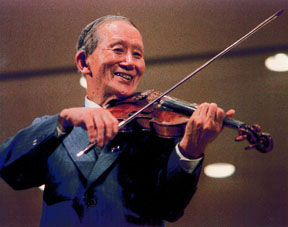The Suzuki Method
"More than fifty years ago, Japanese violinist Shinichi Suzuki realized the implications of the fact that children the world over learn to speak their native language with ease. He began to apply the basic principles of language acquisition to the learning of music, and called his method the mother-tongue approach. The ideas of parent responsibility, encouragement, constant repetition, etc., are some of the special features of the Suzuki approach." - SAA
“Basically, the Suzuki method is founded on the idea that when children learn the way they are naturally built to learn, they can pick up anything, and take it to an unbelievable level. The model for this natural learning process is the way in which children learn their native language; thus, it is often called the Mother Tongue method. There are elements of Suzuki music education that are an attempt to imitate this natural process.
- Being surrounded by the material (playing CDs, going to concerts, etc.
- Consistency of practice every day!!!!
- Support and involvement from family
- Not reading from a page until the material is internalized
- Positive support and encouragement
If you continue to think of what we do here as trying to learn a language, a lot will start to make more sense. For instance, a common question is, “Why do I really have to come to the group class?” None of us learned how to speak in a private lesson, we just sort of picked it up through observation and practice. And we all did practice. How many times do you have to try before you can say “Daddy” correctly? Sometimes hundreds or thousands. It starts with a little noise, and then it starts to become more and more recognizable until it eventually evolves into, “Daddy, I want the car keys.”
It’s important for the parent(s) to be totally involved in the private lessons, group lessons, and home practice. The practicing must be consistent every day, just as an infant will practice speaking every waking minute. For a beginner, 15-20 minutes every day is sufficient.”
-2008 Neil Bakshi
10 Life-Skill Benefits of Studying Music
• Improves Cognitive Skills: Musicians simultaneously use several parts of the (Thinking) brain. Many experts believe that studying a musical Instrument can improve one’s IQ by as much as 7 points.
• Improves Concentration: A music student must become calm and centered in order to learn. He learns to focus on small details which lead to more thorough learning and facility.
• Develops Memory: In our current society, so much can be learned by instant research on the internet. However, the ability to memorize is declining in most children. Suzuki children memorize everything they play.
• Encourages Self-Discipline: Music students learn to successfully prioritize daily tasks and plan a regular practice time to accomplish goals.
• Improves Co-ordination: Playing an instrument improves small muscle development and teaches a child to be able to do different and, often contrasting, movements with each hand.
• Improves Eye-Hand Co-ordination: My children’s baseball coaches and typing teachers frequently commented that they liked working with piano students because their eye-hand co-ordination was such an asset.
• Teaches Problem-Solving: Practice is the art of evaluating what is happening and Skills finding solutions.
• Teaches the Value of Patience: Effective learning requires repetition and review of skills coupled with perseverance.
• Builds Confidence: Mastery of pieces teaches children that they can conquer other tasks they may encounter. Performing polished pieces gives children the ability to be poised in front of an audience. It even enhances the ability to speak in public.
• Develops Harmonious Family Relationships: When Suzuki Parents serve as practice partners they interact positively with their children in order to achieve success at something bigger than themselves. Parents and children learn skills from each other that can be applied to other relationships as well.
Result: You get a valuable return on your investment of time, money, commitment and love!
Suggested Readings
Shinichi Suzuki, Nurtured by Love
Shinichi Suzuki, Ability Development From Age Zero
Shinichi Suzuki, Ability Development From Age Zero
Ed Kreitman, Teaching From the Balance Point
Ed Sprunger, Helping Parents Practice
Jerelene CannonDiamond In the Sky


